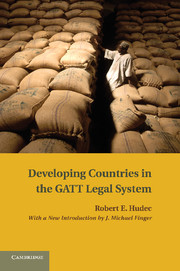Foreword by Hugh Corbet
Published online by Cambridge University Press: 03 May 2011
Summary
RELATIONS between developed and developing countries in the international trading system, whose norms, rules and procedures are set out in the General Agreement on Tariffs and Trade (GATT), have been reaching an impasse. For a quarter of a century, the developed countries have been allowing, or encouraging, the developing countries to become contracting parties to the GATT without requiring them to abide by the more important obligations of membership. What is more, they have acquiesced in the formal derogation from the principle of non-discrimination, which is the keystone of the GATT, to permit the Generalized System of Preferences (GSP) in favor of developing countries to be established and maintained.
At the same time, developing countries – especially the more advanced ones – have been faced with discriminatory protection against them whenever their exports have been uncomfortably successful in the markets of developed countries, with such protection often taking the form of export-restraint arrangements negotiated “outside” the framework of GATT norms, rules and procedures.
The costs to developing countries of limitations on their access to the markets of developed countries are not so much offset as multiplied by their more or less complete freedom to establish and maintain trade regimes which are highly protectionist and Byzantine in their complexity.
- Type
- Chapter
- Information
- Developing Countries in the GATT Legal System , pp. xi - xivPublisher: Cambridge University PressPrint publication year: 2010



